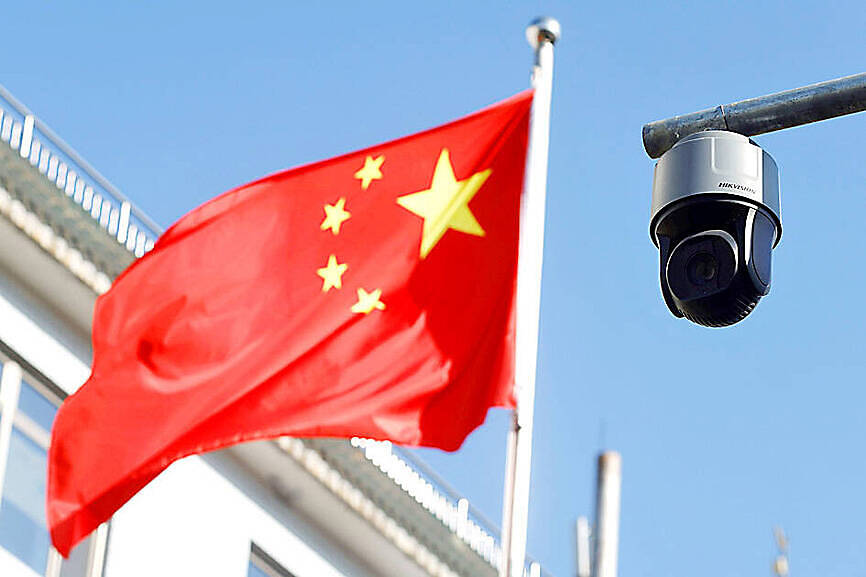New hotlines to help people evaluate possible safety risks before they travel to China, Hong Kong or Macau have been launched, the Mainland Affairs Council said in a statement on Monday.
The hotlines were launched amid a rise in inquiries from Taiwanese planning to travel to China, the council said.
The number of people who used its “Online Registration System for Taiwanese Citizens Visiting Mainland China” this year through Oct. 31 had increased 14-fold from the same period last year, it said.

Photo: Reuters
Registrations for people traveling to Hong Kong and Macau had increased five-fold from the same period last year, it added.
Taiwanese traveling to China do not have to inform the government, but for safety reasons, there is a system that allows it, the council said.
To assist people to use the new online registration system, or to evaluate potential safety risks of their travel plans, the council and the Straits Exchange Foundation jointly launched the hotline services, which are available on weekdays from 9am to 5pm, it said.
People planning to travel to China can use the Mainland Affairs Council’s hotline at (02) 2397-5589 (ex 5011) or the Straits Exchange Foundation’s hotline at (02) 2175-7000 (ex 7033), while people traveling to Hong Kong or Macau can contact the council at (02) 2397-5589 (ex 6015), the statement said.
The services were launched after Beijing amended and enacted national security laws in the past few years, and on June 21 issued a new set of guidelines targeting advocates of Taiwanese independence.
There have also been multiple cases of Taiwanese being “illegally detained, held and interrogated” in China, the council said.
The council on June 27 raised its travel alert for China, Hong Kong and Macau to the second-highest “orange” level, urging people to avoid unnecessary travel there due to increasing safety concerns, it added.

Taiwanese can file complaints with the Tourism Administration to report travel agencies if their activities caused termination of a person’s citizenship, Mainland Affairs Council Minister Chiu Chui-cheng (邱垂正) said yesterday, after a podcaster highlighted a case in which a person’s citizenship was canceled for receiving a single-use Chinese passport to enter Russia. The council is aware of incidents in which people who signed up through Chinese travel agencies for tours of Russia were told they could obtain Russian visas and fast-track border clearance, Chiu told reporters on the sidelines of an event in Taipei. However, the travel agencies actually applied

Japanese footwear brand Onitsuka Tiger today issued a public apology and said it has suspended an employee amid allegations that the staff member discriminated against a Vietnamese customer at its Taipei 101 store. Posting on the social media platform Threads yesterday, a user said that an employee at the store said that “those shoes are very expensive” when her friend, who is a migrant worker from Vietnam, asked for assistance. The employee then ignored her until she asked again, to which she replied: "We don't have a size 37." The post had amassed nearly 26,000 likes and 916 comments as of this

US President Donald Trump said "it’s up to" Chinese President Xi Jinping (習近平) what China does on Taiwan, but that he would be "very unhappy" with a change in the "status quo," the New York Times said in an interview published yesterday. Xi "considers it to be a part of China, and that’s up to him what he’s going to be doing," Trump told the newspaper on Wednesday. "But I’ve expressed to him that I would be very unhappy if he did that, and I don’t think he’ll do that," he added. "I hope he doesn’t do that." Trump made the comments in

New measures aimed at making Taiwan more attractive to foreign professionals came into effect this month, the National Development Council said yesterday. Among the changes, international students at Taiwanese universities would be able to work in Taiwan without a work permit in the two years after they graduate, explainer materials provided by the council said. In addition, foreign nationals who graduated from one of the world’s top 200 universities within the past five years can also apply for a two-year open work permit. Previously, those graduates would have needed to apply for a work permit using point-based criteria or have a Taiwanese company